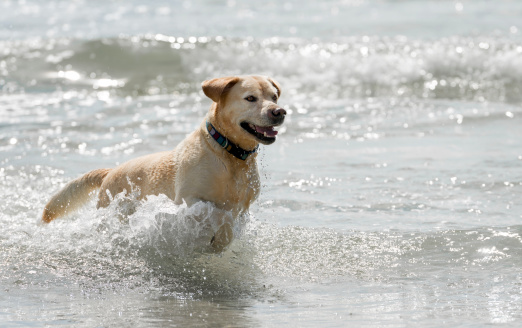
While the beach is a great place to cool off for animals and humans, make sure to take plenty of water for both and do any running along the surf line. Hot sand can burn paws as well as feet.
The National Weather Services offers the following advice for those who have to be outdoors when temperatures hover around 100 degrees Farenheit. And remember, heat indexes make temperatures feel five to 10 degrees hotter than measured. To keep cool during the heat of the day, be sure to:
• Stay hydrated
• Take frequent breaks in an air-conditioned room
• Wear light-weight and light-colored clothing
Signs of heat stroke include:
• High body temperature of 104 degrees Farhenheit or above
• Altered mental state or behavior
• Naseau and vomiting
• Flushed skin
• Rapid breathing
• Racing heart rate
• Headache
Anyone suffering from any of these symptoms should seek medical attention immediately.
CONSERVE ELECTRICITY
Use these tips to reduce energy usage during extreme heat:
• Turn your AC up to 78 degrees
• Use ceiling and personal fans when possible
• Reduce use of your major appliances
Everyday tips for reducing energy usage (and saving your utility bills from climbing with the temperatures) include:
• Keep doors, windows and shades closed during the day to reduce heat coming into the house
* Use desk lamps with CFLs instead of overhead lights
• Wash clothes with cold water (about 90 percent of the energy used by washing machines goes to heating the water)
• Seal cracks, gaps and leak and add insulation, which can save up to 20 percent on home heating and cooling costs
• Use the microwave instead of the stove to cook (microwaves uses two-thirds less energy)
• Clean or replace filters in your home once a month
• Use dishwashers and clothes washers and dryers at night, which keeps your house cooler and reduces the strain on the power grid during the peak usage hours of 4-6 p.m.
PROTECT YOUR PETS
Dogs are especially susceptible to high temperatures. People Assisting Animal Control recommend these pet safety tips:
• Provide shade and water to protect pets from dehydration
• Never leave a pet in the car, even with windows cracked
• Avoid pavement: if it’s too hot for bare feet, it’s too hot for bare paws
• Limit exercise so pets don’t over exert themselves in the heat
Signs of heat stroke in an animal include:
• Excessive panting
• Discolored gums
• Mobility problems
Whether animal or human, seek medical attention immediately if suffering signs of heat stroke.





